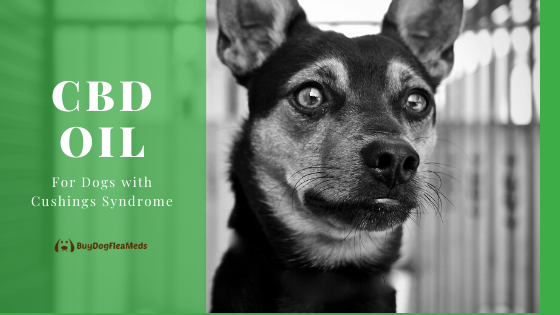Adrenal gland disorders such as Cushing’s syndrome in cats and dogs are hard to diagnose. The vet may order a series of tests to determine the type of Cushing’s syndrome present in your pets. Understanding Cushing’s syndrome will help you decide when and how to get proper treatment.
If your dog/cat is diagnosed with Cushing’s syndrome, CBD oil might be of help. In this article, we will show you the beneficial effects of CBD oil (hemp oil extract) to your furry friends. We will also explain how hemp oil can treat adrenal gland disorders such as Cushing’s syndrome.
What Is Cushing’s Syndrome in Dogs and Cats
Also known as hyperadrenocorticism, Cushing’s syndrome is a condition that occurs when there is excessive production of hormones in the adrenal glands. Cushing’s syndrome usually happens in middle-aged and older dogs/cats. The adrenal glands, which are located above the kidneys produce too much cortisol that goes directly into the bloodstream, causing a group of symptoms.
This group of signs and symptoms is called a syndrome. The hormone cortisol regulates many different bodily functions including anti-inflammatory, immunosuppressive, and homeostatic (maintaining balance) functions. Overproduction of cortisol in the adrenal glands results from either pituitary or adrenal gland tumor.
Different Types of Cushing’s Syndrome
The two major types of Cushing’s syndrome in dogs and cats are pituitary-dependent and adrenal-dependent.
- Pituitary-Dependent Cushing’s Syndrome
This is the most common type of Cushing’s syndrome in animals, affecting almost 80-90% of the total population of animals with Cushing’s. This is mainly caused by a pea-sized tumor in the pituitary gland, which is located at the base of the brain.
- Adrenal-Dependent Cushing’s Syndrome
Adrenal dependent type results from a tumor in one of the adrenal glands. These are a pair of glands located on top of the kidneys. Adrenal dependent Cushing’s syndrome affects 15-20% of diagnosed dogs.
There’s also another type of Cushing’s syndrome that results from chronic steroid use in animals. This is called iatrogenic Cushing’s syndrome.
Symptoms of Cushing’s Syndrome in Cats and Dogs
Diagnosing Cushing’s syndrome in felines and canines can be a little tricky since the manifestation of the disease is similar to diabetes. The most common signs and symptoms of dog/cat hyperadrenocorticism include:
- Excessive thirst and increased urination
- Noticeable weight gain, usually around the waist and abdominal area
- Irritability and agitation
- Hair loss
- Lack of interest and restlessness
- Poor skin health
- Bruising and changes in skin pigmentation
- Decreased bone and muscle mass
Cushing’s syndrome is a chronic and progressive disease – meaning, the initial symptoms are mild or subtle. These will become more noticeable and severe in the following days.
How to Diagnose Cushing’s Syndrome in Cats and Dogs
The following tests will help diagnose Cushing’s disease in your pets:
- The Low/High Dexamethasone Suppression Tests
- Endogenous ACTH (Acetylcholine) Level
- Imaging Tests – Ultrasound, CT-scan, MRI (Magnetic Resonance Imaging)
- Complete Blood Count
- Urinalysis
How to Prevent Cushing’s Syndrome in Dogs and Cats
To prevent the occurrence of Cushing’s syndrome in your favorite pets, do the following:
- Give your pets a healthy, and well-balanced diet.
- Give them daily supplements such as Vitamins C and D, calcium, and zinc to increase their immunity against diseases.
- Do not give foods that contain too much sodium, fats, and sugar.
- Avoid things that can give too much stress to your pets.
- Regularly visit your vet for immunization, vitamin-mineral supplementation, and general check-up.
- Immediately bring your canine or feline to the vet clinic when there are signs and symptoms of Cushing’s disease.
Natural Remedies for Dog and Cat Cushing’s Syndrome
Medical management, which includes medications and treatments, may cause adverse reactions and side effects to your pets. If you’re a fan of natural and organic treatments, check-out the following:
- Fish Oil
Fish oil is a popular natural treatment for almost all kinds of animal diseases. Increased cortisol production decreases the immunity of cats/dogs that may result in inflammation of the skin. Fish oil is one of the healthier remedies for skin inflammation. There are over-the-counter fish oil capsules that can be given to your dogs. The recommended dose for skin disease is 60-100mg/kg-cap twice a day. Before buying, consult your vet about it.
- Low-Carb Diet
A low-carb diet can be used as a nutrition management plan for Cushing’s syndrome. Reducing your pet’s carbohydrate intake can help eliminate the signs and symptoms of the disease. Replace grains with potatoes, beans, or peas. For better results, do the preparation yourself.
- Herbs
Many different herbs are believed to be effective in treating Cushing’s syndrome. Some of these powerful plant herbs include clover, garlic, kelp, nettle, and rosehips.
- Acupuncture
Acupuncture is a traditional Chinese medicine that can help treat different animal diseases. This oriental medicine works by stimulating different acupressure points to relieve the symptoms of the disease. Acupuncture also helps relieve stress, anxiety, and agitation in dogs and cats. The acupuncture therapy helps regulate the endocrine system and relieves inflammation in your pet’s body.
CBD Oil for Cushing’s Syndrome in Dogs and Cats
The use of Cannabidiol or CBD oil is becoming a popular treatment nowadays. Its health benefits and powerful healing properties have been receiving consistent praises from different parts of the world. CBD oil generated from the hemp plant is mainly used as an analgesic and anti-inflammatory medicine. Cannabidiol contains lower than 0.3% of tetrahydrocannabinol (THC), the active substance of the hemp plant. This amount makes CBD oil not psychoactive and safe to use.
CBD oil directly affects the endocannabinoid receptors that maintain homeostasis or balance in the body. Cannabidiol is also believed to have a direct effect on the secretion of cortisol. The Brazilian Journal of Medical and Biological Research examined the effect of CBD on cortisol levels of humans. They found out that CBD oil can lower the production of cortisol in the blood. Today, CBD oil is constantly being used in veterinary medicine as a treatment for different animal diseases.
CBD Oil Dosage for Cat/Dog Cushing’s Syndrome
The standard initial dosage of CBD oil for Cushing’s syndrome is 0.2 mg/kg twice a day. For pain and inflammation, you can increase the dosage to 2-3 mg/kg twice daily. If you find it difficult to calculate the dosage, you can refer to this dosage chart.
CBD oil is considered a wonder drug that can treat almost all kinds of animal disease symptoms. If you think your furry friends have signs and symptoms of Cushing’s syndrome, or if they’ve already been diagnosed with this adrenal gland disorder, you can consider CBD oil as an alternative treatment. But always remember, your veterinarian’s advice is still the best treatment for Cushing’s syndrome.
References:
https://veterinarypartner.vin.com/default.aspx?pid=19239&id=4951495
https://www.researchgate.net/publication/23955106_Cushing’s_Disease_in_Dogs_and_Humans
https://icatcare.org/advice/cat-health/hyperadrenocorticism-cushings-disease
https://www.petmd.com/dog/conditions/endocrine/c_dg_hyperadrenocorticism

